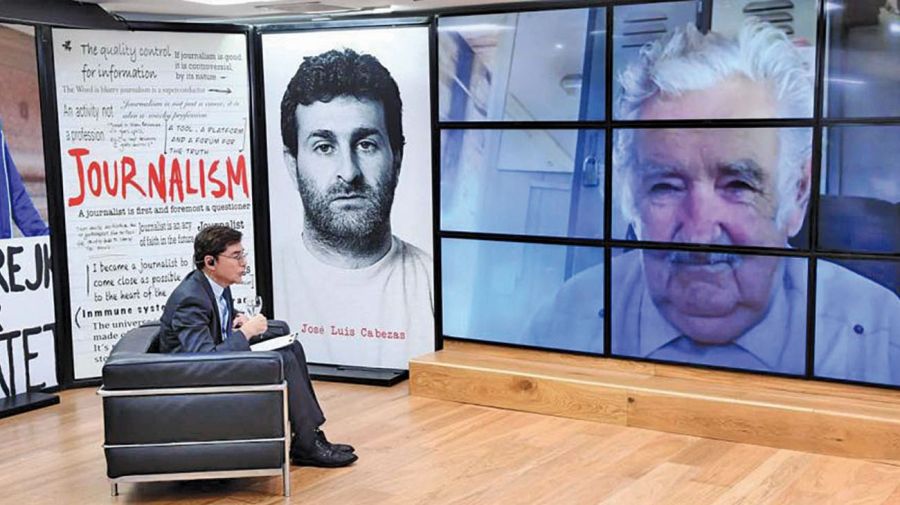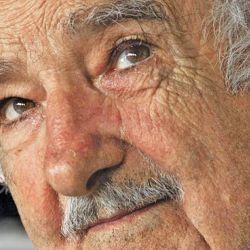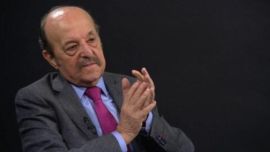José ‘Pepe’ Mujica says he has won the respect of almost everybody, "although many still ignore” him. Even so, he sends a clear message to anybody listening to him in Argentina: in his traditional, folksy style he suggests: "Sip a mate with those who disagree with you and try to understand how they think."
The former Uruguayan president highlights "the slightly social democratic" character of all his compatriots, recognising that he is the most Peronist of all his Frente Amplio comrades. And he shows joy over the possible return of Luiz Inácio Lula da Silva to the presidency in Brazil, affirming: "He’s more intelligent and docile than Jair Bolsonaro."
You said: “The only merit we might have is that over time we have managed to maintain continuity in certain issues and we are not revolutionaries in the sense of being able to change everything. We change things gradually but we don’t tear down everything done by others. This gives us a certain stability.” Here in Argentina we interpret that Uruguay must thus have discovered at some point that confrontation was not the correct course. Was that so?
That’s too rational, as if all society could be contained within the head of an individual. A society is an accumulation of experiences, of comings and goings with the result meeting them in the middle. We’re not as perfect as we might appear but we have an important degree of stability, when compared with the recent history of Latin America. We naturally have our contradictions. Modern societies are increasingly difficult because of the great diversity of interests they contain, a rising trend.
Uruguay is a model for Argentines. For Frente de Todos and pan-Peronism, Uruguay is respected for the successes of Frente Amplio while for Juntos por el Cambio, Luis Lacalle Pou is the model. I ask myself if such choices do not rather bespeak a lack of models and self-esteem in Argentina. How do you see this process in Argentina over the years?
Reality and the image it transmits are highly tinged by one’s perspective which tends to enhance reality so a certain dichotomy of vision would not surprise me. It seems that such dichotomy is everything for Argentina’s destiny.
What do you think of the number of Argentines who choose to live in Uruguay and not just in Punta del Este but even in Montevideo?
That’s happened often in our history, for better or for worse. You need to know history. The old feuding between unitarians and federalists made our land a place of refuge.
At the close of the Second World War, our government with Eduardo Rodríguez Larreta as foreign minister called for intervention according to the logic that when one country is disordered the others should help out. This position caused a scandal in Latin America in the times of Juan Perón, only finding support in Guatemala and the United States with the rest of Latin America almost ready to put us to the torch. The struggles during the Perón times meant our becoming a refuge for incomers while later it was the other way round. We were tied even when it comes to moments of uncertainty.
The number of us Uruguayans emigrating to Argentina was not small either. This is the only place in the world where Uruguayans go unnoticed. We are brother peoples born out of the same womb. We “Orientals” are a fragment of Argentina, both by virtue of geography and history, because our territory was always the target of Portuguese and later Brazilian ambitions.
Colonia del Sacramento was founded by the Portuguese. That old rivalry would be maintained by the struggle between ports. Paradoxically the Spanish Navy set up its South Atlantic base in the Port of Montevideo, so that the port rivalry between Montevideo and Buenos Aires goes back to colonial times. With independence port dominance translated into the ability to collect taxes since the infant states practically lived off import duties. Collecting taxes in turn permitted armies to be raised. Our federalism was founded by José Gervasio Artigas. We needed a national figure so we transformed him into a founding father, although he never thought of himself that way, what he wanted was a federal organisation. So you see our history has its ins and outs.
Isn’t it a betrayal of that fraternal spirit if a Uruguayan government offers Argentine citizens tax breaks to the detriment of Argentine revenue? How do you see that seduction?
I don’t like those things. They will trigger, sooner or later, a fitting response from Argentina. I went through that but I’m not the government now. For five or six years the confrontation across the River Plate practically determined that no Argentine came to Uruguay. I lived through that in the 1950s and remember that well. If tomorrow an Argentine government responds defensively, the coming and going will start. The only thing it will do is cloud the relatiónship. I’m not responsible for that.
Does the proximity between Uruguay and Buenos Aires, concentrating 40 percent of Argentina’s population with half its economic output, essentially modify our geopolitics? Is there anywhere else with facing capitals offering a kind of asylum?
Buenos Aires has transformed itself into the knot of the River Plate as its heavyweight. Its gravitation for both Argentine and our history is enormous. Even if Argentina’s political organisation unfolded as federalism, there can be no doubt that Buenos Aires became the funnel. Concentration on that scale is perhaps a pending problem. With the old man’s perspective I have today and knowing River Plate history as I do, if I were 40 years younger, I’d adopt Argentine citizenship and take my fight to Buenos Aires where the future of the River Plate is at stake. But I’m an old man and on the shelf.
The farewell [to the Senate] of you and Julio María Sanguinetti sparked admiration and envy, with the other ex-president reading an Octavio Paz poem about the reconciliation of two enemies being the incarnation of intelligence. Does reconciliation require intelligence and how should the relationship with former foes?
For a long time I’ve been fighting fanaticism within myself. Fanaticism debases people, generating hatred, which is a very negative and tremendously destructive posture. It has being blind in common with love and blindness is a form of stupidity. It’s one thing to be passionate and convinced of what you’re defending and another thing to fall into fanaticism, which does not allow you to perceive the tones of reality. In politics living with hatred is the greater evil but in human relations it’s worse – it makes us complete imbeciles.
The hug with Sanguinetti suited the country and society. It was not any renunciation, which nobody was requesting anyway. We need to cultivate a “we,” which is what remains because what happened happened and is over. The problem is what is to come, the future. If you let yourself be blinded by the past, you forget the value of those who are to come. If we cannot leave them a better world, let’s at least try not to make it worse.
Each human being is like the centre of a planetary mini-system with the affection of other people rotating around it. You have to think of what is going to stick around afterwards, it’s the only thing which counts. That’s one way of looking at life. I don’t even hate those who tortured me. I was president and I dedicated myself to not using the presidential powers to persecute anybody. It might have seemed to some that I’m absent-minded but I’m not.
You said in recent statements that Argentina is unhinged. Do you think that’s partly due to our not having succeeded in emerging from our hatred?
Yes, I think that people cannot get together but it’s worth meeting up, sipping mate under a tree and starting by commenting on football, talking, trying to build bridges in common. The problem is to build. It’s very easy to destroy while building is very difficult but when you build something, it lasts over time. If not we’re always kicking off.
The book Mujica por Pepe was written by former Argentina’s Education Minister Nicolás Trotta with a prologue by Alberto Fernández and an epilogue by Lula. There, the Argentine president says that you like saying that you never sought to be a hero. When you were a guerrilla, did you seek to be a hero and afterwards realise that there were other and better forms of heroism?
As homo sapiens, we are partly the product of our times. I belong to a time when many youngsters were convinced that it was possible to create a society with no dividing-lines between mine and yours, that it was possible to construct a world with other keys. That’s what set us into motion and we dropped many things along the way.
We made many sacrifices and we made many mistakes for sure but we were convinced, as well as certain that Uruguay was drifting into dictatorship. That was the model then in Latin America. We wanted to be in condition to transform a strike into an insurrection and sweep it [the dictatorship] away. But we failed for various reasons.
Time has shown us other things. We were playing some wrong keys. We believed in a somewhat Leninist vision of the state and social classes. We did not realise how heavy-handed bureaucracy can be. What bothers some people is that we did not simply cross over to the other side with our weapons. We are not satisfied with the world in which we live and continue struggling to remedy it, if nothing more, and we aspire to create what homo sapiens can create because the conditions for a better society exist but not by the paths of which we dreamed.
This is serious stuff. Summing up so much history in so few words is a bit crude.
Can a hero by definition understand other people?
Heroes do not cease to be human beings, sometimes they’re OK, sometimes not. They’re not puritans or perfect, just human. The most important thing is that they are symbols which serve as banners. In the long time they count and define the size of the queue. Heroes might or might not be martyrs but they do determine the changes in history, which arrive from main currents which sometimes use human symbols, heroes, banners or leaders but the most important things are invisible to the eye.
After the government defeat in the PASO primaries, you recommended: “They need to shut themselves away for a month drinking mate and discussing, not cursing away in the press, in order to generate half a dozen central issues as state policies.” Are there difficulties, not only between the [ruling] coalition and the opposition but also within Frente de Todos, to sit down and understand one another?
I know it’s very difficult but I realise that is what the Argentine people need.
How do you see the evolution of Argentina’s la grieta polarisation?
I don’t know. It’s clear to me that things cannot function when one half of the country is against the other half. The struggle is to recognise reality. If that’s the reality, you need to sit down to negotiate, exchange ideas and lower the decibels.
There are two parallel chapters – the objective differences in thinking and the subjective differences imposed by insult. That does not explain the question but sets such a serious tone as to make temperance impossible. That’s what I see on the other side of the river. Maybe I’m putting my foot into it.
No, you’re not.
I feel myself to be a cousin of Argentina and also an interested party, because my little country does well when Argentina does well.
You also said: “Politics is not for making money. When money gets mixed up with politics and trade unionism, we’re screwed. Money-lovers should pick professions in industry, agriculture or trade and pay taxes, not mix things up.” Is it an error for businessmen like Mauricio Macri, Sebastián Piñera or Vicente Fox to dedicate themselves to politics?
Yes, they’re different passions and I’m not referring to bad faith. I’m saying that they will always have a unilateral tunnel vision. Subjectively they will tend to think that what’s good for business is good for the country. Sometimes that’s so but sometimes not.
On the other hand, we human beings are gregarious animals who roamed the world until the agricultural revolution around 30,000 years ago, which is when the concept of mine and yours started, complicating things. Along with mine and yours the state was formed as a relative of property. Even so, we continue to be gregarious and cannot live alone.
In ancient law the worst punishment after the death penalty was to be expelled from the community. It was terrible not having a group to back you up and even today, for the Aymara people, poverty is not having any community. Naturally, the development of the market economy has accentuated our individualistic character. There were always conflicts between society and the individual. Each individual is specific and the role of politics is to cool tempers and negotiate so that the poncho of society can survive and cover us all.
Is there any point of comparison between Luis Lacalle Pou and Mauricio Macri or between [Uruguayan rightist] Guido Manini Ríos and Javier Milei?
I do not judge compatriots whom I consider adversaries. I would not be doing my country a good turn.
Some years ago you interviewed the Catalan writer Manuel Vázquez Montalbán, who apart from being a Communist was a bon vivant and gourmet who lived in the most upmarket zone of Barcelona and enjoyed the finest wines. When asked to reconcile his lifestyle with his political ideas, he replied: “I’m a Communist but not an idiot.” Does being a Communist or a leftist oblige you to take a vow of poverty?
They’ve made out of me the legend of being the poorest president and that kind of thing. I’m not poor – it’s an option of lifestyle defined long ago and my way of fighting for my freedom. If I allowed myself to be enslaved by the market civilisation, I’d spend my life seeking the means of paying off the infinite instalments.
They tell you the myth of happiness. Being free means spending as much time as possible in my life doing the things I like. If I multiply my obligations, I can kiss freedom goodbye. I must submit myself to the law of need because I have allowed my needs to multiply to fantastic lengths. My sober way of life is my way of guarding my freedom but I wouldn’t want to impose it on anybody else. Let everybody do what they want. I have friends in all social classes. I don’t question anybody but don’t question my freedom.
How do you analyse Uruguay’s handling of the pandemic? Their standards of vaccination were highly praised.
It has a good side and a negative side, like everything. In the first stage we dithered and delayed too much. One thing is a country with 50 or 100 million inhabitants and another with three million. There was probably the illusion that the international mechanisms would work out but they did not – they were delayed and so were we, letting opportunities slip. They made one official in contact with Pfizer say they weren’t interested and later they threw him out. That was never clarified. But then the process began and things were resolved.
There was a time last February when the scientists were recommending harsh measures and people were dying on us. Probably less would have died if the politicians had heeded the scientists. Then vaccination was extended and produced results.

When did you have your two jabs?
I took my time. I suffer from a chronic disease, a variation of vasculitis, one of those illnesses which never leaves you. It does not bother me for four or five years at a time and then one day it crops up. At the time they recommended against my being vaccinated because I would be under attack from my immune system. But now after consulting a doctor I became convinced that it was too big a risk and that I’d better get vaccinated. So I did and nothing happened.
Have you received a double dose and with what vaccine?
Yes, both jabs. In Uruguay, Pfizer is reserved for the very aged.
How would you compare Argentina with Uruguay, including the incidence of polarisation?
Here the Colegio Médico grouping doctors asked for strict quarantine from the start and the government opted for what it called “responsible freedom.” The dimensions work out in our favour without the masses of people which Argentina has. I was once in Tokyo where three million people pass through the railway station everyday. The situations cannot be compared. I admire the Japanese for the way they can handle these things.
So are smaller countries like the Scandinavian [nations] or Uruguay easier to handle?
Yes, of course. More than the countries with multitudes, apart from the Chinese who have their magical beehive methods. And not because they are Communists, they are Confucian, which is something else. They go where the government orders and not because they are rabbits or sheep, it’s something else.
Today’s left defines itself as feminist and committed to the environment. How does a militant born in 1935 view these two causes?
If you understand feminism as recognising the weight of patriarchal society and the historic debt to women, of which the most flagrant is the wage difference for the same work, then I’m a feminist to the death.
The equality of rights is beyond discussion. Fortunately we are not equal – we are complementary, which is another story. A humanity consisting only of men with a vegetable system of reproduction would be disastrous. The female face is a component of history, we need it. But this difference cannot cloud class differences. It mortifies me that it is sometimes forgotten that the poorest women are those most left behind. They are burdened with a patriarchal society, poverty and the mandate of child-raising imposed. The feminism we most need is that which defends women most because that is the way to defend the species. I think we humans always go around needing a mother, whether we realise it or not. That is the female face in history. But I must be very old-fashioned.
And the environment?
I’m not a pantheist but almost. I adore nature. I can spend hours watching the adventures of an insect. Now the southern lapwings – our Uruguayan national bird – are having and defending their chicks in the fields. It’s a show and also a part of me.
We should know that if our future lifestyle is that of opulent societies, the planet with its billions of people will not resist. If we really want to be environmentalists, we must adopt a way of life which helps to look after the environment. That contradicts the market economy, which needs us to be voracious consumers. This is a phenomenal contradiction, as in that Charles Chaplin film when the kid goes breaking the glass and then comes to mend it. It seems that first we want to destroy everything and then go fix it. It would be better to destroy less.
What is your relationship with Pope Francis? I suppose you feel represented by the encyclical Laudato Si?
I’m a political friend of the Pope. It’s curious because I’m not a believer but I have great affection for the Roman Catholic religion. One of my ideals is a federal America and the main things in common are the language and the Catholic tradition. This is a cultural component, a backbone despite all our grief. I respect it institutionally.
Are you an atheist or an agnostic?
I don’t believe in God or anything like that. I believe in life. I adore life.
When you see the birds minding their future offspring, I would imagine that you believe in some order or path in evolution. What is your relationship with metaphysics?
Magical.
Kant said: “I marvel when I see the stars above me and the moral law within me.”
All life makes me marvel. I cannot stop being a utopian animal for such is mankind. There is no human group which has not invented something to believe in. The marvellous thing is that while they could not prove anything, they were capable of dying for what they believed. If that is not utopian, I don’t know what is. That’s a constant of homo sapiens throughout history.
My Utopía is a love of life in an inert world. The sense of human life is to give nature a minute of awareness to try and reform it. This does not cease to be a sentimental explanation because one struggles to find a meaning to life.
And at the age of 85 have you found any sense?
Yes. Spending my remaining time of life as far as I can so others remain. Good leaders, who struggle for change with a positive vision, are ones who let people surpass them in the long term so that they raise the old banners and will continue the struggle. That’s the meaning of my life: transmitting myself to those who remain, having done everything possible. I’m a kind of old tree who is trying to let as much light as possible pass through so that little trees may grow and that instead of a tree there is a little forest.
Do you watch the stars at night?
Yes, sometimes. It’s moving.
What do you think then?
That all men who believe themselves very great and very important should be condemned to look at the stars every night.
Have you reflected on the origins of our thinking? You say that you do not believe in an afterlife and that you are not a believer in the metaphysical sense. But have you thought about where all this comes from?
I believe in the language of biochemistry, in that function called photosynthesis, the most important natural function on Earth. Each time a leaf is produced, there is a chain reaction of 30 to 40 chemical reactions within fractions of a second, of which we only know the beginning and the end. There is something magical, of course, the mechanisms of nature leave one open-mouthed. That’s why I have an immense respect for religion. Human beings have always asked that “Why?” question about this marvellous order and found no answer. Resorting to faith is natural.
If you could put the clock back, what would you change in your life?
That depends on what age you are talking about.
Would you be a guerrilla again?
That depends on the state of the world because that’s not a profession, just a path. Unfortunately human beings cannot outlive their prehistory. I’ll get over mine the day that war is abandoned but the homo sapiens whom I know is nowhere near that point. Right now military budgets worldwide must be eating up something like US$3 million per minute.
How much does Brazil influence Uruguay and the region, bearing in mind that Lula will probably be back in 14 months’ time?
It’s important because Brazil does not have Peronism, Brazil has Lula. One thing is the PT (Partido Trabalhista) with Lula and another thing without – it all revolves around him. That’s very dangerous. Lula never stopped being a trade union leader, he’s a born negotiator. That could be important for the Americas.
Naturally, the destiny of the continent depends a lot on Brazil, you only have to see the barbarities in Amazonia. Lula is instinctively far more docile and intelligent than Jair Bolsonaro, opening up a chapter of hope. There are some weird phenomena in contemporary politics with personalities like Donald Trump or Bolsonaro appearing. At times you get the impression that people are voting against without having any clear idea whom they are electing. It’s a negative reaction. Personalities like Bolsonaro are on the fringe of being weirdos from a psychological viewpoint.
How would you compare the PT with Kirchnerism? You were president with Lula in Brazil and the Kirchners in Argentina. Are there parallel lives between Buenos Aires and São Paulo?
Brazil is something else. They’re samba with African blood in their veins and that incredible joie de vivre.
What would the return of Lula be like?
As a born negotiator, Lula is very aware that he cannot push his luck at the expense of the people. He will always try to accentuate a distribution favouring the interests of the workers and the poorest but he will look after the industry of São Paulo and of Brazil and the productive sector in general. It will be a Brazil seeking to open up markets and establish the presence of its companies here and there. His fight with the business world is over distribution but at the same time he wants them to live and fight for Brazil. In no way can Lula be defined as a fanatical socialist. He is much more a kind of social democrat within Brazilian conditions.
An Argentine intellectual, Jorge Alemán, says that the movements tagged as populist (sometimes pejoratively) like Lula, Kirchnerism, Peronism and (somewhat differently) your Frente Amplio and such leftist and centre-left movements of South America are the equivalent of European social democracy. Is there a point of contact between Lula, yourself, Kirchnerism and social democracy?
Social democracy was to a large extent cradled by a given situation in the world. On the one side was the red peril with the figure of Joseph Stalin at the close of the war and on the other side was the United States bonanza. They did not want to create the social conditions for the Red Army to continue advancing politically, that was dangerous, so they invented the Marshall Plan. Capitalism very intelligently created the welfare state, which we call social democracy, something which lost weight when the red peril faded. The historical framework is very deterministic. Ideas cannot be isolated from their times, they must be placed within the context of reality.
You said that if you were 40 years younger, you would come to Argentina to fight for the needed changes. What would be the plan behind those changes?
I haven’t thought it out but I would drink a lot of mate with those who think differently and spend a lot of time in conversations. I would try to respect and motivate the worlds of labour and science all I could, cutting back on squandering money and investing far more in brainpower. Less gloss and luxury. I would seek more tertiary training for youth. In our days the proletariat were people dressed in overalls and leather caps. In the future they will be people in academic gowns or office garb with tertiary education and training. The true battle is in the universities and with the universities. The future will implacably be a knowledge society. The problem is for what and for whom that knowledge will work.
What party would you join?
The party of hope.
That would be a new party.
We’re dreaming, my dear fellow. No way I’m going to Argentina but I love Argentina. Or at least I suffer from her, please believe me.
“Argentina has a marvellous pampa: it permits the luxury of being destroyed, only to resurge and keep going”
There are people who go and live in Montevideo to be safer. But the number of murders per million inhabitants in the City of Buenos Aires is lower than in Montevideo. Is Uruguay idealised?
Yes. We have our sins and problems but we’re a village when compared to that gigantic world of Buenos Aires. We’re more family-sized, perhaps that’s what makes many people coming out of Argentina fall in love. We are more small town, down to earth, making us a permeable country. In Uruguay we have 3.5 million people with 13 (sometimes almost 14) million head of cattle or four per inhabitant without counting the sheep. Argentina has a meat problem but it has more or less the same number of animals and people (45 million). You thus cannot compare the two countries. Within our modesty and humility we are a formidable cattle-breeding country but not so agricultural. Argentina has a marvellous pampa – it permits the luxury of being destroyed, only to resurge and keep going.
Some 50 years ago Uruguay had 2.8 million inhabitants so that over the last half-century its population has grown by less than 30 percent while Argentina’s has doubled. Uruguay exported population while Argentina imported it. How does that modify geopolitics? Is emigration a minus and immigration a plus?
Uruguayan movements were not deliberate, they were the result of the situation. Many Uruguayans found no other solution than to escape, going everywhere – many left for Argentina but also Spain, the United States, everywhere. And we have an extremely low birth rate. Many Paraguayans, Bolivians and (in the south) Chileans went to Argentina. The same happened with many countries of the Americas but very few came to Uruguay. Argentina attracts – you see it on the map while we’re a small corner protuberance perhaps beneath any consideration.






























Comments